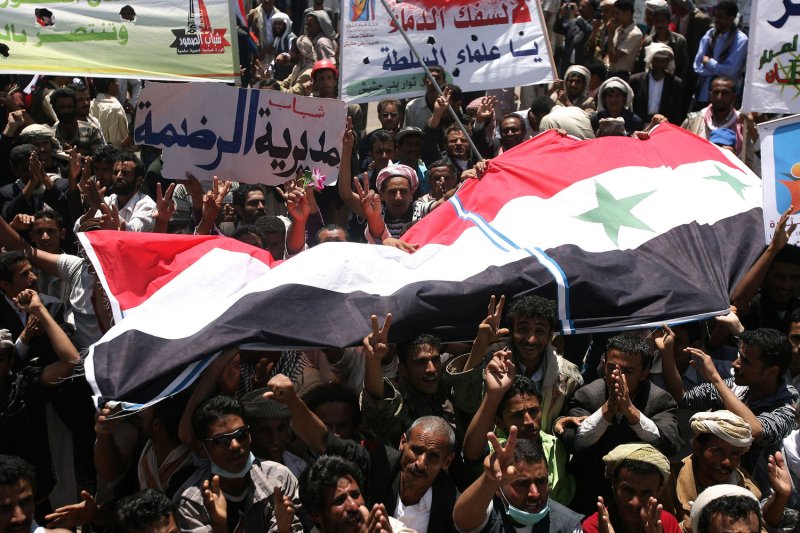1 of 3 | Yemeni protestors A hold Yemeni and Syrian national flags, and chants slogans during a demonstration demanding the resignation of Yemen's President Ali Abdullah Saleh and Stop the killing in Sanaa, Yemen, Monday, October 3, 2011. Human Rights Watch condemned what it viewed as an apathetic response by the U.N. Human Rights Council to ongoing violence in Yemen. scores of people have been killed in the last few weeks, Human Rights Watch said, as the security situation there deteriorates. UPI/Abdulrahman Abdallah. |
License Photo
DAMASCUS, Syria, Nov. 4 (UPI) -- Syrian government forces used gunfire to disperse protesters Friday and at least four civilians were killed, a human rights group said.
The official Syrian Arab News Agency, meanwhile, reported 13 soldiers and police officers were killed fighting "armed terrorist groups" in three cities, CNN reported.
The violence came a day after government forces killed at least 25 civilians and rounded up protesters and two days after Arab League ministers said President Bashar Assad agreed to take the army off the streets, release people jailed since the protests started in March and allow international journalists to monitor the situation.
A representative of the Syrian Observatory for Human Rights in London said two of the civilian deaths Friday were reported in the northwestern city of Homs, the other two in Daraa in southern Syria.
The human rights group said government forces Friday surrounded the Abu Bakr mosque in Baniyas, assaulting some people leaving, and trapped hundreds of others inside to keep them from protesting. Government forces also turned out near the Fattahi mosque in Lattakia, the Local Coordinating Committees, which helps organize protests, said.
The Syrian Observatory reported explosions in a Daraa neighborhood and said forces used gunfire to disperse protesters in Deir Ezzor. The LCC said protesters marched in Hasakeh and Hama, while government snipers were positioned around a market and mosques.
How Syrian troops responded to anti-government protests Friday was seen as a test of whether the Assad regime supports the Arab League pact, an opposition leader said.
"The opposition does not believe for a moment that Assad is genuine ...," Syrian National Council presidential adviser Ausama Monajed told the non-profit Institute for War and Peace Reporting.
Meanwhile, the leader of a Syrian insurgent army said forces are organizing in Turkey to confront Assad.
The leader of the Syrian Free Army, encamped in eastern Turkey, said the force wants to be the "military wing of the Syrian people's opposition to the regime," the British newspaper The Daily Telegraph reported Friday.
"We are the future army of the new Syria. We are not in league with any particular sect, religion or political party. We believe in protecting all elements of Syrian society," said Col. Riad al-Assad, the army's leader.
Syrian Free Army fighters, mainly defectors from the Assad's army, are conducting "high-quality operations against government soldiers and security agents," Assad said.
The colonel said he wanted the Syrian Free Army to be recognized as the military presence of the Syrian National Council, the umbrella political opposition.
"We are waiting for them to appoint a high delegation and send a representative to speak to us about how we can support their aims militarily," he said.
CNN reported the Syrian Free Army said it would abide by the Arab League agreement if the Assad regime does so but warned if the government does not, "we will be compelled to protect the protesters and work on bringing down the regime no matter how much that may cost us."
The United Nations estimates more than 3,000 people have died in Syria since anti-government protests began in March.















